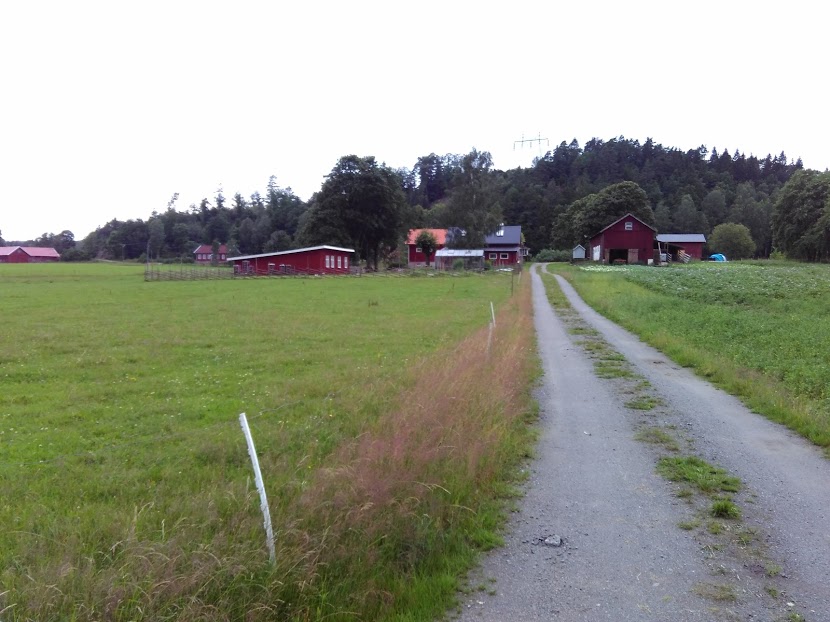
Around four in the morning I look at the clock, wrap my head more carefully in a blanket to enjoy a bit more darkness. Shortly after 6 o’clock the alarm clock rings, so I can go for a run before breakfast.
Breakfast is on the table on time – I am grateful to those who chose to make the breakfast today. I choose porridge. There’s enough porridge, most of the participants prefer the homemade bread. Morning lectures are fascinating. Although it’s not the first time I’ve heard what’s most important for child development from birth till six years of age, Britta from Denmark and Vikki from a training centre in England speak so clearly that I am once again captivated by the simplicity and truthfulness. I swear to myself that we will be just as clear when we demonstrate this concept to the youngest children’s parents at the beginning of the school year.
The lectures were interrupted by a snack, the adolescents from the local school made chocolate balls with oatmeal for us. I lick myself up to my ears and I’m full of energy. Lunch is Swedish, again made by the adolescents. We get several special bowls with food for vegans, vegetarians, gluten-free diet and sugar-free diet.
I’m feeling unwell during the afternoon lecture. The topic is interesting, but the weight under which my eyes are closing is so strong that I sometimes can’t concentrate on anything other than how to sit up straight with my eyes open.
 We have our second seminar today. I’m ready with my copies of both texts. I have a question related to the text, but the initial question asked by someone else takes the topic elsewhere. I’m trying to refocus and look for the answer in the text. Timidly I read aloud what I see as related to the topic. The response is lukewarm. I’m overwhelmed by sadness that I can’t understand the text as I’d like to, and express myself as I’d want to. For the rest of the seminar I’m trying to listen and hope no one can see that I’m crying.
We have our second seminar today. I’m ready with my copies of both texts. I have a question related to the text, but the initial question asked by someone else takes the topic elsewhere. I’m trying to refocus and look for the answer in the text. Timidly I read aloud what I see as related to the topic. The response is lukewarm. I’m overwhelmed by sadness that I can’t understand the text as I’d like to, and express myself as I’d want to. For the rest of the seminar I’m trying to listen and hope no one can see that I’m crying.
After the seminar, I waited for Lesley, who wanted to talk to me. She asked me whether I understood everything. I tried to explain that I understand more than I am able to express. Before dinner I wrote part of the work that had been assigned for today. Dinner was prepared by other fellow-students – my gratitude to them was enormous, they cooked a delicious risotto.
Even though it rained a little and we got more than enough work for today, right after tea I went for a walk on the first road that branches off from the main road. I need to clear my head. During my morning jog on the first day I met a reindeer. Since then, my children have been reminding me over the phone to take a picture of it when I see it again. I go about equipped with the phone on standby but the reindeer is nowhere to be seen. I say hello to two Swedes who are looking out of the window in disbelief at who’s walking around. I smile at them to let them know that I don’t mind the rain.
I walk back along the pigs on the farm, which belong to the local adolescents. After the rain, the pigs smell more than usual and I reassure myself that I’m more of a vegetarian and pigs are not the basis. I join the group who have just brought the shopping. Dinner needs to be cooked quickly, the shopping took a long time and everybody’s hungry. I helped with baking peaches, whereas cleaning the living room, which is my job today, I only did cursorily. I have a good feeling that I did something meaningful and didn’t just blindly follow a prescribed schedule.
After dinner, a few students are sitting in the living room, reading up for tomorrow’s seminar. The environment feels cozy, I’d like to join them, but first I need a shower. Meanwhile, the group almost broke up. Finally, I get down to reading, too. I identify the passage that I don’t understand and I’m trying to find the answer. I go through the whole book, I found one short sentence. I’m trying to accept that I did my best and lie down, with my head wrapped in a blanket, to create at least a little bit of darkness. It’s 11:30pm, it’s still light outside.
Renata Špalková, Táňa Kadlecová and Helena Matoušková from the Czech Republic took part at the AMI Orientation to Adolescent Studies (ages 12 – 18) in cooperation with NAMTA in July 2016 in Montessoriskolan Lära för livet, Rydet, Sätila, Sweden. The three ladies are all active in the growing Czech community of adolescent studies. In three places in the Czech Republic they build their Adolescent communities.
http://www.montessorimozaika.cz